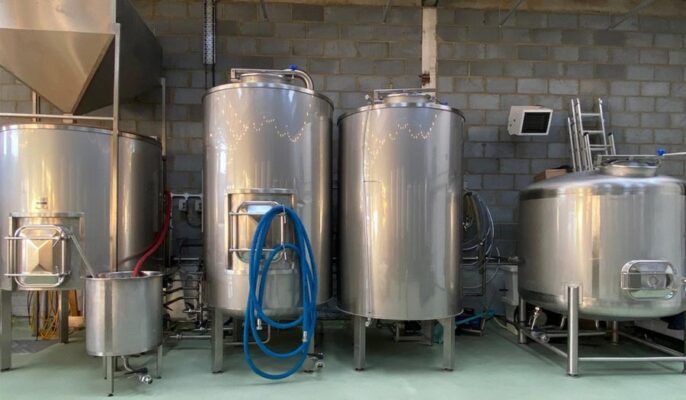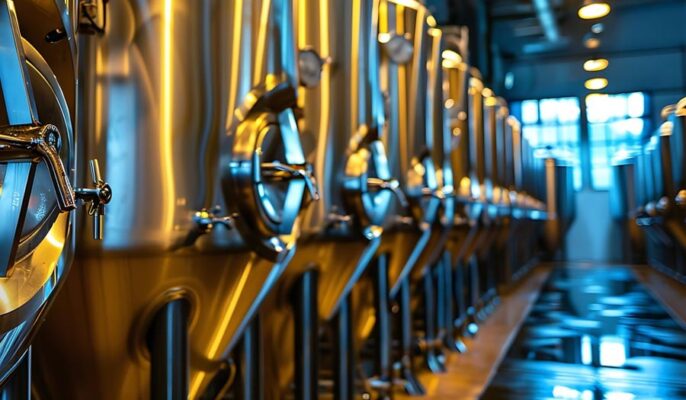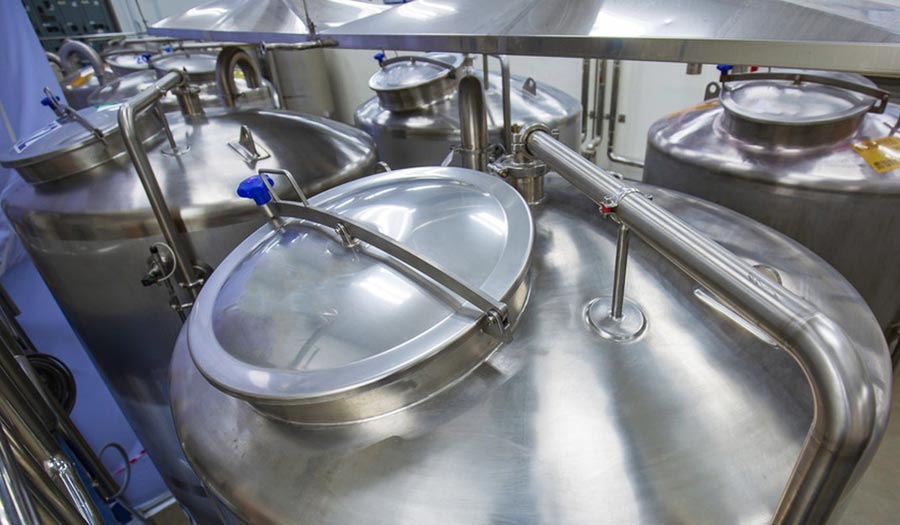先進的なビール醸造機器は、ビール製造の効率と一貫性を向上させ、業界の飛躍的な進歩を象徴しています。自動醸造機器から高効率熱交換器まで、これらの機器は醸造工程の自動化レベルを高めるだけでなく、品質管理の最適化や労働力の削減にも重要な役割を果たしています。高度な醸造設備は、製品の品質と生産速度を向上させながら、すべてのビールバッチが厳格な基準を満たすことを保証します。
なぜ高度なビール醸造設備が必要なのか?
生産効率の向上
先進的なビール醸造設備は、レシピの配合、温度検査、発酵モニタリングなど、多くの複雑な醸造工程を自動化することができます。これにより、手作業による作業時間が大幅に短縮され、生産効率が向上するため、生産能力が向上します。
製品品質の確保
醸造設備 温度制御された発酵槽や自動醸造システムなどの主要パラメータ(温度、圧力、発酵時間など)を正確に調整・維持し、バッチごとに一貫した味と品質を保証します。自動洗浄・除菌システムは、人為的な介入に伴うリスクを軽減し、衛生的な製造環境と安全なビールを提供します。
柔軟性と革新性の向上
高度なレシピ管理システムにより、醸造者は市場の需要の変化に対応するため、醸造レシピを迅速に調整し、最適化することができる。設備の拡張性により、醸造所は少量生産の試験から大規模生産まで、需要に応じて生産規模を調整できる。
簡単な操作
オートメーションとインテリジェント機器は、熟練労働者への高い要求を軽減し、オペレーションを容易にする。操作手順が簡素化されることで、複雑な操作への依存が減り、トレーニング・コストが削減される。

上級の基本構成要素 ビール醸造設備
高度なビール醸造設備は生産性を高めるだけでなく、安定したビールの品質を保証します。それでは、高度なビール醸造キットに見られる基本的な構成要素を見てみましょう。これらのキットには通常、高品質の醸造機器と特殊な材料が含まれており、自家醸造体験を大幅に向上させることができます。
ビールには基本的な材料が必要
- モルト・グレイン(麦芽):ビールのボディ、色、風味を自分好みにカスタマイズするために、様々なスペシャル・グレインを使うことができる。
- ホップ:様々な種類のホップがあり、上級者向けのキットでは苦味のレベルや独特のアロマを試すことができる。
- 酵母の種類適切な酵母菌株は、ビールの風味や特徴を左右します。アドバンスド・キットでは、様々なビールスタイルに合うよう、様々な菌株を用意しています。
高品質の醸造設備
自動制御システム
自動化制御システムは、現代のビール醸造設備の中核をなすコンポーネントのひとつです。従来の醸造工程は手作業に頼っていましたが、今日の自動化システムは製造工程全体を完全に監視・制御することができます。センサーとデータ収集システムにより、温度、圧力、pHなどの主要パラメータが醸造プロセス中にリアルタイムで監視されます。統合されたデータ分析により、オペレーターは予知保全を行い、生産工程を最適化し、安定した製品品質を確保することができます。遠隔操作と調整のサポートにより、オペレーターはどこからでも機器を制御することができ、生産の柔軟性と応答性を高めることができる。
モルト・ミル
モルトミルはビール醸造の最初の工程です。その主な役割は、麦芽粒を粉砕して、その後の醸造工程に適した粉末やペレットにすることです。この工程は「マッシング」と呼ばれ、麦芽からデンプンを放出させ、マッシュの段階でデンプンが発酵可能な糖分に効率よく変換されるようにします。最近の製麦業者には、安定した醸造品質を確保するために、マッシュの粒度を制御する精密な調整システムが装備されていることがよくあります。
マッシュ・タン
糖化機は、粉砕した麦芽を水と混ぜて加熱する重要な装置である。マッシュタンの間に、麦芽に含まれるデンプンが糖に変換されます。先進的なマッシュタンクは通常、精密な温度制御システムを備えており、さまざまな醸造ニーズに応じて温度と時間を調整することができる。さらに、最新のマッシュタンクには、均一な混合を保証する自動攪拌システムが装備されているものもあり、醸造効果と効率が向上しています。
フィルター
液体はフィルタースロットを介して固液分離する必要がある。このプロセスにより、発酵した糖を含む糖化液(液体)から麦芽スラグ(固体)を分離します。高度なフィルタースロットは、分離プロセスの効率と信頼性を確保するために、効率的なフィルター媒体と自動残渣排出システムを備えています。

ゆで鍋
煮沸釜は糖化液を煮沸する設備。この段階でビールの花を糖化液に加え、ビール独特の香りと苦味をつける。煮沸釜の設計には通常、効率的な熱交換システムと、煮沸工程の均一性と安定性を確保するための正確な温度制御装置が含まれている。最近の煮沸釜は、エネルギー効率を高め、資源の無駄を省くために、蒸気リサイクルシステムを備えていることが多い。
発酵槽
発酵タンクはビール醸造において最も重要な設備のひとつで、発酵プロセスを制御するために使用されます。発酵タンクの設計には、正確な温度制御システム、圧力制御システム、混合装置などが含まれ、発酵プロセスに最適な条件を確保します。最新の発酵タンクは通常、発酵の安定性と一貫性を確保するため、発酵プロセスにおける様々なパラメーターをリアルタイムで追跡する自動制御システムと監視装置を備えている。自動混合システムは、発酵液との均一な混合を助け、発酵効果と本体の均一性を向上させます。
ボトル/缶
瓶や缶のラインは、出来上がったビールを最終容器に詰める装置です。この工程には、ボトル/缶、充填、閉栓、マーキングが含まれる。最新のボトル/缶は通常、生産効率と包装品質を向上させるため、高速自動化装置が装備されている。装置の正確な制御と効率的な操作は、ビールの貯蔵・輸送工程で安定した品質を確保する鍵です。インテリジェントな検出システムを装備し、製品の一貫性と品質を保証するために、包装の過程で様々なパラメータを監視します。
制御システム
先進的なビール醸造装置には通常、醸造プロセス全体を監視・調整する包括的な制御システムが装備されている。これらのシステムは、リアルタイムで装置の動作状態を追跡し、パラメーターを自動的に調整し、データ分析とレポート機能を提供することができます。効率的な制御システムは、生産の柔軟性と一貫性の向上に役立ちます。
要約する
先進的なビール醸造設備は、伝統工芸の技術進歩の革新を象徴しています。オートメーション制御システムからインテリジェント発酵タンクに至るまで、各技術の向上はビール製造の品質と効率をより高いレベルへと押し上げています。私たちはビール機器メーカーとして、高品質なビールを求める市場のニーズに応えるため、絶え間ない技術革新に取り組んでいます。また、先進的な醸造設備を持ち、醸造計画を開始したい場合は、次の連絡先に連絡することができます。 MICETグループ.我々は、プロの技術サポートとカスタマイズされた設計を持っています。
高度なビール醸造設備に関するFAQ
先進的なビール醸造設備の主な種類は?
高度なビール醸造設備の主な種類は以下の通り:
- モルトミル:麦芽を粉砕してマッシュ用の粒子にする。
- マッシュタンク:麦芽と水を混ぜ、マッシュプロセスのために加熱する。
- フィルタータンク:マッシュ液中の固形粒子を分離する。
- 沸騰ポット:マッシュ液を加熱し、沸騰させるためにホップを加える。
- 冷却器:沸騰した液体を発酵温度まで急速に冷却する。
- 発酵タンク:発酵を行い、糖分をアルコールと二酸化炭素に変える。
- フィルター:発酵中の微粒子や酵母を取り除く。
- 瓶詰め/缶詰ライン:出来上がったビールを最終容器に詰める。
- オートメーション制御システム:生産工程をリアルタイムで監視・制御。
- 洗浄システム:機器や容器を自動洗浄し、衛生を確保。
ビール醸造における自動制御システムの役割とは?
自動制御システムは、生産工程における温度、圧力、pHなどの主要パラメーターをリアルタイムで監視・調整するために使用されます。これは、操作を自動化し、手作業を減らし、生産効率を向上させ、一貫した製品品質を保証します。さらに、データ分析やリモートコントロール機能をサポートし、生産の柔軟性と応答性を高めます。
発酵槽のスマートな機能とは?
正確な温度と圧力制御により、最適な条件下で発酵が行われます。発酵液の自動攪拌と均一混合により、発酵効果を最適化します。発酵プロセスのリアルタイムデータが記録・分析され、プロセス調整と品質管理に役立ちます。
ビール製造の衛生条件を確保するには?
定期的な洗浄と除菌 自動洗浄システムを使用して、装置や容器を定期的に洗浄します。高効率のろ過システムにより、製造工程で発生する不純物を除去します。モニタリングシステムにより、生産環境の衛生状態をリアルタイムで検知・管理します。




